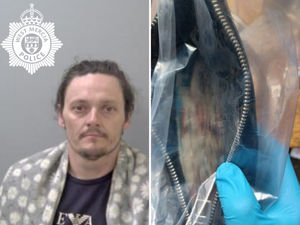Revealed: Telford pensioner was investigated for Nazi war crimes
A pensioner from Telford was the first person in the UK to be officially investigated for his alleged role in the Holocaust, it has been revealed.

Stanislaw Chrzanowski was 96 when he died in October last year, and had no idea he was being investigated for Nazi war crimes during the Second World War, a BBC investigation found.
Mr Chrzanowski, from Hadley, was being investigated in Munich for the murder of civilians in his home town of Slonim in Belarus, Eastern Europe.
He first came to England after being taken as a prisoner of war and joining Allied forces.
The claims first surfaced when his stepson John Kingston went to police.
He said his stepfather had told him stories of his actions during the war, which he said helped him collect together a dossier of evidence.
Mr Kingston, who died last week, told them: "I think it's good that Germany should actually do something to try to put the past right.
"My stepfather is just one individual, and there were thousands like him, so it's more important that he's an example or a case in particular."
In 2001 The Guardian reported that Mr Kingston had at that time spent over a decade trying to establish the involvement of his stepfather in the murder and torture of 45,000 prisoners in Slonim, searching birth, death and marriage certificates, newspaper files and archives and travelling to Slonim to interview eye-witnesses.
Case reopened
He was questioned by Metropolitan Police detectives but they said there was insufficient evidence and no further action was taken.
But Nazi war crime crime prosecutors based in Ludwigsburg, Germany, asked to see the interviews and the case was reopened.
Mr Chrzanowski, who also lived in Holmfirth for a short time, had always denied he was a war criminal.
Thomas Will, deputy Nazi war crime prosecutor in Ludwigsburg, believed there was sufficient evidence from the accounts to launch a criminal investigation and the federal court ruled last July that he could be tried in Germany, passing the case to prosecutors.
The case could have long-lasting effects, as it clarifies for German prosecutors who they will be able to investigate.
They say it means anyone who served in a German unit can now be prosecuted - regardless of their nationality, the nationality of their victims or where the crimes were committed - as long as there is an accusation of murder.
German prosecutors confirmed they were now looking through immigration records for possible new suspects in the UK.
Andrej Umanski, a legal expert at Cologne University, said: "I would say we are pushing the law to its maximum and showing that crimes like this will be punished even 70 years afterwards because they were so grave."




